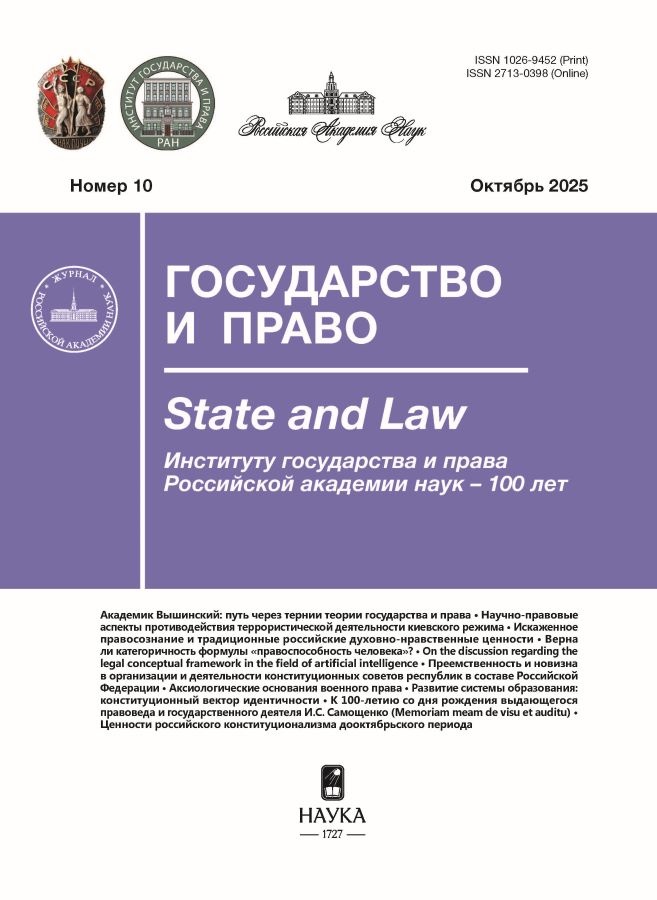The development of the education system: the constitutional vector of identity
- Authors: Kabyshev S.V.1,2
-
Affiliations:
- The State Duma of the Federal Assembly of the Russian Federation
- Kutafin Moscow State Law University (MSAL)
- Issue: No 10 (2025)
- Pages: 142-150
- Section: Law and education
- URL: https://ter-arkhiv.ru/1026-9452/article/view/693389
- DOI: https://doi.org/10.31857/S1026945225100131
- ID: 693389
Cite item
Abstract
The article examines the identity of the Russian education system as one of the key elements of sovereign state development from a constitutional and legal perspective. Distinguishing between the categories of national and constitutional identity, ideally normative and actually social in their understanding, the author argues that Russia, rethinking its civilizational uniqueness, is moving in the constitutional process towards a more complete formalization of historically established values and ideas that define the education system, giving them a regulatory character and protection mechanisms, which should be adequately reflected in currently developing an education development strategy. The constitutional identity of the national education system is defined as a set of essential parameters of the education system determined by the values, principles, goals, linguistic and civilizational identity of the people, explicitly or implicitly enshrined in the Constitution and stemming from the national heritage. The key characteristics of this identity are: fundamentality, unity of education and upbringing, discipline, connection with vitality, striving for progress. The central role of the teacher is emphasized, the possibilities and risks of introducing artificial intelligence technologies as a tool are discussed, but not the values of the educational model itself.
About the authors
S. V. Kabyshev
The State Duma of the Federal Assembly of the Russian Federation; Kutafin Moscow State Law University (MSAL)
Author for correspondence.
Email: svkabyshev@mail.ru
Moscow; 9 Sadovaya-Kudrinskaya str., 125993 Moscow, Russia
References
- Bondar N. S. Russian legal education as a constitutional value: national traditions and cosmopolitan illusions. Ser. “Library of Judicial Constitutionalism”. Iss. 3. 2nd ed., supplement. M., 2014 (in Russ.).
- Vinogradova E. V., Danilevskaya I. L., Patyulin G. S. Legal science and education as elements of the Russian constitutional and legal identity // Education and Law. 2022. No. 6. Pp. 100–108 (in Russ.).
- Vygotsky L. S. Collected works: in 6 vols. Vol. 3. Problems of the development of the psyche / ed. by A. M. Matyushkin. M., 1983. P. 211 (in Russ.).
- Zorkin V. D. Lectures on law and the state. SPb., 2024. P. 28 (in Russ.).
- Kolyushin E. I. The phenomenon of a country-civilization in the mirror of the Constitutional Law of Russia // State and Law. 2025. No. 2. Pp. 24–31 (in Russ.).
- Lazarev V. V. Ideology of constitutional reform of the legal system of the Russian Federation // Journal of Russ. law. 2021. No. 4. P. 7 (in Russ.).
- Lotman Yu. M. What people learn. Articles and notes. M., 2009 (in Russ.).
- Makarenko A. S. Pedagogical works: in 8 vols. M., 1983. Vol. 1. P. 12 (in Russ.).
- Mendeleev D. I. Cherished thoughts. St. Petersburg, 1903– 1905. P. 251 (in Russ.).
- Pleshakova A. Yu. On the definition of the concept of identity of the national system of vocational education // Vocational education in the modern world. 2023. Vol. 13. No. 4. Pp. 671–679 (in Russ.).
- Razumov V. I. Education of the XXI century: in search of a new identity // Philosophy of education. 2023. Vol. 23. No. 2. Pp. 23–36 (in Russ.).
- Saratov draft of the Constitution of Russia / preface by V. T. Kabyshev. M., 2006 (in Russ.).
- Ushinsky K. D. Collected works: in 10 vols. Vol. 2 “Pedagogical articles of 1857–1861”. M. – L., 1948. Pp. 161, 162, 165 (in Russ.).
Supplementary files










